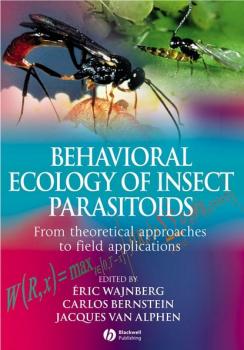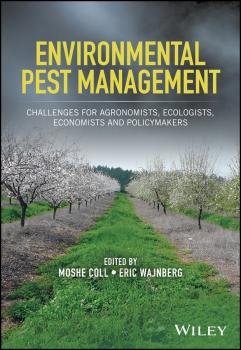ТОП просматриваемых книг сайта:
Eric Wajnberg
Список книг автора Eric WajnbergАннотация
Written by a team of leading international specialists, Behavioral Ecology of Insect Parasitoids examines the optimal behaviors that parasitoids exhibit in order to maximize long term offspring production. It is an essential reference for research scientists and students studying these fascinating insects or for anyone involved in using parasitoids in biological control programs. Reviews topical issues, including cutting edge research on parasitoid decision making and the implications for biological control Explores applications in other fields, provides information on the latest research methods, and includes helpful case studies and statistical tools Creates a deeper understanding of the link between behavioural strategies and host mortality, resulting in more efficient selective pest management programs “Overall, this is a fascinating volume that provides a significant contribution to the literature on parasitoid insects. It goes a long way toward providing insights into numerous aspects of parasitoid behavior and will stimulate a diversity of future projects, something that should be the goal of any such text. I highly recommend Wajnberg et al. for all of those working on the biology or evolution of parasitoids.” Palaios 2009
Аннотация
Insect parasitoids are a fascinating group of animals in many respects. Perhaps the most fascinating point is that these insects, in the course of the evolutionary time, have developed an impressive way to use chemical compounds to dialogue with the different protagonists of their environment (i.e., conspecifics, their hosts and the plants on which their hosts are living). Unravelling the evolutionary meaning of such chemical communication networks can give new insights into the ecology of these insects and especially on how to improve their use for the control of noxious pests in biological control programmes. Chemical Ecology of Insect Parasitoids is a timely publication, with organised chapters to present the most important knowledge and discoveries that have taken place over the last decade, and their potential use in pest control strategy. Specific relevant case studies are presented to enhance the reader's experience. Suited to graduate students and professional researchers and practitioners in pest management, entomology, evolutionary biology, behavioural ecology, and chemical ecology, this book is essential for anyone needing information on this important group of insects.
Environmental Pest Management. Challenges for Agronomists, Ecologists, Economists and Policymakers - Eric Wajnberg
Аннотация
A wide-ranging, interdisciplinary exploration of key topics that interrelate pest management, public health and the environment This book takes a unique, multidimensional approach to addressing the complex issues surrounding pest management activities and their impacts on the environment and human health, and environmental effects on plant protection practices. It features contributions by a distinguished group of authors from ten countries, representing an array of disciplines. They include plant protection scientists and officers, economists, agronomists, ecologists, environmental and public health scientists and government policymakers. Over the course of eighteen chapters, those experts share their insights into and analyses of an array of issues of vital concern to everyone with a professional interest in this important subject. The adverse effects of pest control have become a subject of great concern worldwide, and researchers and enlightened policymakers have at last begun to appreciate the impact of environmental factors on our ability to manage pest populations. Moreover, while issues such as pesticide toxicity have dominated the global conversation about pest management, economic and societal considerations have been largely neglected. Environmental Pest Management: Challenges for Agronomists, Ecologists, Economists and Policymakers is the first work to provide in-depth coverage of all of these pressing issues between the covers of one book. Offers a unique multi-dimensional perspective on the complex issues surrounding pest management activities and their effect on the environment and human health Addresses growing concerns about specific pest management strategies, including the use of transgenic crops and biological controls Analyses the influence of global processes, such as climate change, biological invasions and shifts in consumer demand, and ecosystem services and disservices on pest suppression efforts Explores public health concerns regarding biodiversity, pesticide use and food safety Identifies key economic drivers of pest suppression research, strategies and technologies Proposes new regulatory approaches to create sustainable and viable crop protection systems in the framework of agro-environmental schemes Offering a timely and comprehensively-unique treatment of pest management and its environmental impacts in a single, inter-disciplinary volume, this book is a valuable resource for scientists in an array of disciplines, as well as government officials and policymakers. Also, teachers of undergraduate and graduate level courses in a variety of fields are sure to find it a highly useful teaching resource.



